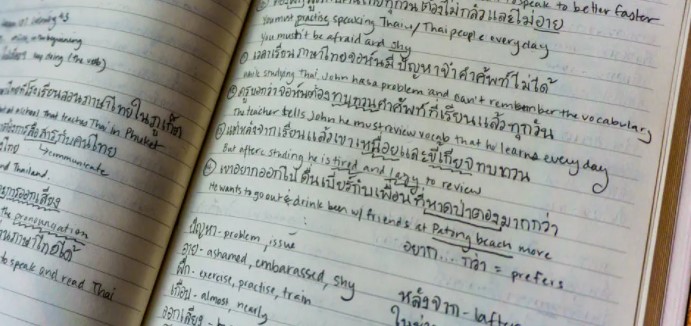How Singaporeans can learn Thai Language quickly
As Southeast Asia neighbours, there are definitely similarities between the Thai Language and Singlish. This post will explore some similarities between Thai and other Asian languages Singaporeans are familiar with.

1. Similar to Singlish, Thai ending particles will change the meaning of the sentence
In Singlish, ending particles will change the meaning of the sentence. For example, “okay lor” (expressing reluctance) is very different from “okay meh” (expressing disbelief). Similarly, the Thai language uses ending particles to convey emotions and change the nuance of the sentence. For example, “pbai lor” – “pbai” means go, “lor” expresses “really?” so “pbai lor” means – “do I really go?” Whereas “pbai si” – “si” is an ending particle to emphasize something. So “pbai si” is ordering the listener to “go!”. Hence, even though you might pick up some ending particles from watching Thai lakorns/dramas, it is always good to check with someone who knows Thai well enough if the usage of the ending particle is correct. You do not want to be rude unknowingly and order someone to do something when your intention is to seek confirmation.
Check out this post on the list of Thai ending particles
2. Thai tones are similar to Chinese tones
For Chinese Singaporeans, good news! The Thai tones can be roughly mapped to the tones in the Chinese language. Both languages have five tones: low, high, rising, falling and flat/no tone for the Thai language vs tone 1, 2, 3, 4 and no tone for the Chinese language. I’ve put into a table below on how the tones can be roughly mapped to each other. Please note that this is not a 100% match – it is just a rough guide I made for myself when I was trying to get used to the Thai tones.
| Thai Tones | Chinese Tones |
| No equivalent Thai tone | 1st tone |
| Rising tone (e.g. หัว huă) | 2nd tone (e.g. 华 huá) |
| Low tone (e.g. ดุ dù) | 3rd tone (e.g. 赌 dǔ) |
| Falling tone (e.g. ได้ dâi) | 4th tone (e.g. 带 dài) |
| Mid/flat tone (e.g. มา maa) | Neutral tone / 轻声 (e.g. 吗) |
| High tone (e.g. นับ náp) | No equivalent Chinese tone |
How I mapped the Thai tones to the Chinese tones – Learnthaiinsingapore.com
3. Some Thai words sounds similar to Teochew, a Chinese dialect
One thing I’ve noticed when interacting with my Thai friends’ parents is that a lot of the older Thai Chinese speak fluent Teochew, a Chinese dialect. Most of the Chinese Thais come from China and a lot of them speak Teochew. Hence, it is of little wonder that the Thai language has “borrowed words” from the Teochew dialect. Some examples of Thai words sounding similar to Teochew are listed below:
| English Word | Thai word / Pronunciation | Teochew word / Pronunciation |
| Chair | เก้าอี้ kao yi | 交椅 gao yi |
| Older sister | เจ๊ je | 姐 che |
| Money | เงิน ngen | 银 ngeng |
Example of Thai words that are similar to Teochew, a Chinese dialect

